- Home
- Fergus Hume
The Third Volume Page 10
The Third Volume Read online
Page 10
CHAPTER IX.
MRS. BEZEL.
ONE cannot always judge by appearances either as regards human beings orhouses. Mr. Hilliston was one excellent illustration of this rule;Clarence Cottage was another. It was in a narrow and crooked lanetrending downward to the right, at the summit of Fitzjohn's Avenue; anunpretentious two-story building, divided from the public thoroughfareby a well-cultivated garden. Therein grew thyme and lavender, marigoldsand pansies; for the owner of the cottage loved those homely flowers,and daily gazed at them from the bow-window wherein her couch wasplaced.
Mrs. Bezel never walked in her garden, for the all-sufficient reasonthat she was a helpless paralytic, and had not used her limbs for overten years. Still a moderately young woman of forty-five, she possessedthe remains of great beauty, ravaged by years of anxiety and mentaltrouble. Those passing along the lane usually saw her pale face at thewindow, and pitied the sufferings written in every line; sufferingswhich were apparent even to a casual glance. Noting the homely garden,the mean-looking dwelling, the anxious expression of the invalid, theydeemed her to be some poor sickly creature, the scapegoat of nature andthe world, who had sought this secluded spot in order to hide hertroubles. This view was not entirely correct.
She was in ill-health, it is true; she dwelt in a small house certainly;and the anxious expression was seldom absent from her face. But she wasin easy circumstances, untroubled by pecuniary worries, and the interiorof the cottage was furnished with a magnificence more suggestive of ParkLane than of Hampstead. The outward aspect of the house, like that ofMr. Hilliston, was a lie.
Her sitting room resembled the boudoir of some Mayfair beauty. Thecurtains were of silk, the carpet velvet pile, the walls were adornedwith costly pictures, and every corner of the small apartment was filledwith sumptuous furniture. All that art could contribute, all thataffection could suggest, were confined in the tiny space, and had Mrs.Bezel possessed the mines of Golconda she could not have been moreluxuriously lodged. The house was a gem of its kind, perfect andsplendid.
Mrs. Bezel took little interest in these material comforts. Her life waspassed between a couch in the bow-window, a well-cushioned chair by thefire, and a downy bed in the next room. She had little appetite and didnot enjoy her food; mental anxiety prevented her interesting herself inthe splendors around her; and the only pleasure she took was her drearyjourney in a Bath-chair when the weather permitted. Then, as she inhaledthe fresh breeze blowing across the Heath, she gazed with longing eyesat London, almost hidden under its foggy veil, far below, and alwaysreturned with reluctance to the familiar splendors of her narrowdwelling. Fortune had given her much, but by way of compensation haddeprived her of the two things she most desired--of health and of love.
Even on this warm June evening a fire burned in the grate, for Mrs.Bezel was a chilly creature, who shrunk at the least breath of wind.According to custom, she had left the window couch at seven o'clock, andhad taken her simple meal while seated in her large chair to the rightof the fireplace. After dinner she took up a novel which was placed on asmall table at her elbow, and tried to read; but her attention was notfixed on the book, and gradually it fell from her hands, while she gazedidly at the fire.
What she saw therein Heaven only knows. We all have our moments ofretrospection, and can picture the past in the burning coals. Some evenpicture the future, but there was none for this woman. She was old,weary, diseased, worn-out, and therefore saw in the fire only theshadows of past years. Faces looked out of the flaming valleys, scenesarranged themselves in the red confusion; but among them all there wasalways one face, one scene, which never vanished as did the others. Thisspecial face, this particular scene, were fixed, immovable, cruel, andinsistent.
The chime of the clock striking half-past nine roused her from herreverie, and she again addressed herself to the novel with a sigh.Tortured by her own thoughts, Mrs. Bezel was not accustomed to retirebefore midnight, and there were nearly three hours to be got throughbefore that time. Her life was as dreary, and weary, and heart-breakingas that of Mariana in the Moated Grange.
The tread of a firm footfall in the distance roused her attention, andshe looked expectantly toward the door, which faced her chair. Thenewcomer passed up the narrow garden path, entered the house, and, aftera pause in the hall, presented himself in the sitting room. Mrs. Bezelknew who it was before the door opened; for standing on the thresholdwas the man with the face she had lately pictured amid the burningcoals. Francis Hilliston and the woman who called herself Mrs. Bezellooked steadily at one another, but no sign of welcome passed betweenthem. He was the first to break the awkward silence.
"How are you this evening, Margaret?" he asked, advancing toward her;"better, I hope. There is more color in your cheeks, more brightness inyour eyes."
"I am the same as ever," she replied coldly, while he drew a chair closeto the fire, and stretched out his hands to the blaze. "Why have youcome here at this hour?"
"To see you."
"No doubt! But with what purpose?"
Hilliston pinched his nether lip between finger and thumb, frowning thewhile at the fire. Whatever had been, there was now no love between thiswoman and himself. But on no occasion had he noted so hostile a tone inher voice. He was aware that a duel of words and brains was about toensue, and, knowing his antagonist, he took the button off his foil.There was no need for fine speaking or veiled hints in thisconversation. It was advisable that all should be plain andstraightforward, for they knew each other too well to wear their maskswhen alone. Under these circumstances he spoke the truth.
"I think you can guess my errand," he said suavely. "It concerns theletter you wrote to Claude Larcher."
"I thought as much! And what more have you to say in connection withthat affair?"
"I have merely to inform you that the man whom you desire to see is inLondon, and will no doubt answer your kind invitation in person."
Mrs. Bezel stretched out her hand and selected a letter from the littlepile on her table.
"If you will look at that," she said coldly, "you will see that Claudeintends to call on me at three o'clock to-morrow."
Taking the letter in silence, Hilliston turned frightfully pale, and theperspiration stood in large beads on his forehead. He expected some suchappointment to be made, yet the evidence in his hand startled him allthe same. The promptitude of action spoke volumes to one of his acuteperceptions. To defend his good name would require all his skill andexperience, for he had to do with men of action, who acted as quickly asthey thought. The duel would be more equal than he had thought.
"Are you still determined to tell all," he said in a low tone, crushingthe paper up in his hand.
"Yes."
The monosyllable was uttered in so icy a manner that Hilliston lost histemper completely. Before this woman there was no need for him to retainhis smiling mask, and in a frenzy of rage he hurried into rapid speech,frantic and unconsidered.
"Ah, you would ruin me!" he cried, springing to his feet; "you woulddrag up those follies of '66, and make London too hot to hold me! Have Inot implored, threatened, beseeched, commanded--done everything in mypower to make you hold your peace? Miserable woman, would you drag theman you love down to----"
"The man I loved you mean," responded Mrs. Bezel, in nowise moved bythis torrent of abuse. "Pray do not be theatrical, Francis. You know mewell enough to be aware that when my mind is made up I am not easilymoved. A man of your brains," she added scornfully, "should know thatloss of temper is but the prelude to defeat."
Recognizing the truth of this remark, Hilliston resumed his seat, andsubdued his anger. Only the look of hatred in his eyes betrayed his realfeelings; otherwise he was calm, suave, and self-controlled.
"Have you weighed the cost of your action?" he demanded quietly.
"Yes. It means ruin to us both. But the loss is yours, not mine.Helpless and deserted, life has no further charms for me, but you, Mr.Hilliston, d
oubtless feel differently."
"Margaret," he said entreatingly, "why do you speak like this? What harmhave I done you that----"
"What harm!" she interrupted fiercely. "Have you not ruined me, have younot deserted me, have you not robbed me of all that I loved? My life hasbeen one long agony, and you are to blame for it all. Not a word," shecontinued imperiously. "I shall speak. I insist upon your knowing thetruth!"
"Go on," he said sullenly; "I listen."
"I loved you once, Francis. I loved you to my own cost. For your sake Ilost everything--position, home, respect, and love. And you--what didyou do?"
Hilliston looked round the room, and shrugged his shoulders. Look andgesture were so eloquent that she commented on them at once.
"Do you think I valued this splendor? I know well enough that you gaveme all material comforts. But I wanted more than this. I wanted love."
"You had it."
"Aye! I had the passion such as you call love. Did it endure? You knowwell that it did not. So long as I was healthy and handsome and brightyour attentions continued, but when I was reduced to this state, tenyears ago, what did you do? Left me to marry another woman."
"It was not my fault," he muttered uneasily; "my affairs were involved,and, as my wife had money, I was forced to marry her."
"And you did marry her, and no doubt neglect her as you do me. Is Mrs.Hilliston any happier in her splendid house at Kensington Gore than I inthis miserable cottage? I think not. I waited and waited, hoping yourlove would return. It did not; so I took my own course--revenge!"
"And so wrote to Claude Larcher!"
"Yes. Listen to me. I wrote the first letter on the impulse of themoment. I had been reading a book called 'A Whim of Fate,' whichcontained----"
"I know! I know! I read it myself this evening."
"Then you know that someone else is possessed of your secret. Who isJohn Parver?"
"I don't know. I intend to find out. Meanwhile I am waiting to hear theconclusion of your story."
Mrs. Bezel drew a long breath, and continued:
"The book, which contained an account of the tragedy at Horriston,brought the fact so visibly before me that I wrote on the impulsetelling you that I wished to see Claude, and reveal all. You came andimplored and threatened. Then my impulse became a fixed determination. Isaw how I could punish you for your neglect, and so persisted in myscheme. I wrote to Claude, and he is coming here to-morrow."
"What do you intend to tell him?"
"So much of the death of his father as I know."
"You must not--you dare not," said Hilliston, with dry lips. "It meansruin!"
"To you, not to me."
"Impossible," he said curtly. "Our relations are too close for one tofall without the other."
"So you think," rejoined Mrs. Bezel coolly; "but I know how to protectmyself. And of one thing you may be assured, I will say nothing againstyou. All I intend to do is to tell him of his father's death."
"He knows it already."
"What?"
"Yes! Did you think I was not going to be beforehand with you," sneeredHilliston triumphantly. "I guessed your intention when you wrote me thatletter, and when Claude arrived in town I saw him before he could callhere. I did not intend to tell him of the matter till your action forcedme to do so. He has read all the papers in connection with his father'sdeath, and intends to hunt down the murderer. Now, do you see what youhave done?"
Apparently the brutal plainness of this speech strongly affected Mrs.Bezel. It seemed as though she had not comprehended till that momentwhat might be the result of her actions. Now an abyss opened at herfeet, and she felt a qualm of fear.
"Nevertheless, I intend to go on now that I have begun," she saidgloomily. "I will answer any questions Claude may ask me."
"You will put him in possession of a clew."
"It is not improbable; but, as I said, life has no charms for me."
"You don't think of my sufferings," said Hilliston bitterly, rising tohis feet.
"Did you think of mine during all these lonely years?" she retorted,with a sneer. "I shall punish you, as you punished me. There is such athing as justice in this world."
"Well, I warn you that I shall protect myself."
"That is your lookout. But I will show you this mercy, as I said before.That nothing will be told by me of your connection with this affair. Asto myself, I will act as I think best."
"You will tell him who you are?"
"Yes; I will tell him my real name."
"Then I am lost!"
"Surely not," she rejoined scornfully. "Francis Hilliston is old enoughin villainy and experience to protect himself against a mere boy."
"It is not Claude I fear, but his friend, Spenser Tait. He is thedangerous person. But enough of this," added Hilliston, striking thetable imperiously. "I forbid you to indulge in these follies. You know Ihave a means whereby to compel your obedience."
"It is your possession of that means that has turned me against you,"she retorted dauntlessly. "If you give me back my----"
"Margaret! Not a word more! Let things remain as they are."
"I have said what I intend to do."
Hilliston ground his teeth. He knew that nothing he could say or dowould shake the determination of this woman. He had already experiencedher resolute will, and not even the means of which he spoke would shakeher immovability. There was nothing more but to retire and protecthimself as best he could. At all events, she promised to remain neutralso far as he was concerned. That was something gained. Before leavingthe house, however, he made one final effort to force her to his will.
"I will not give you any more money."
"I don't care, Francis. This cottage and its contents are settled on me.A sale of this furniture will produce sufficient money to last my life.I can't live long now."
"I will deny all your statements."
"Do so!"
"I will have you declared insane and shut up in an asylum."
Mrs. Bezel laughed scornfully, and pointed toward the door.
"If that is all you have to say you had better go," she said jeeringly."You know well enough that you cannot harm me without jeopardizing yourown position."
They looked at one another fiercely, each trying to outstare the other.Hilliston's eyes were the first to fall, and he hastily turned towardthe door.
"So be it," he said, with his hand on the knob; "you want war. You shallhave it. See Claude, tell him all. I can defend myself."
On leaving the house a few minutes later, he paused irresolutely by thegate and looked back.
"If I could only find the paper," he muttered, "she could do nothing. Asit is----"
He made a gesture of despair and plunged into the darkness.

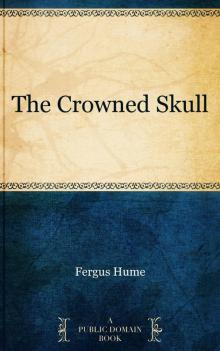 The Crowned Skull
The Crowned Skull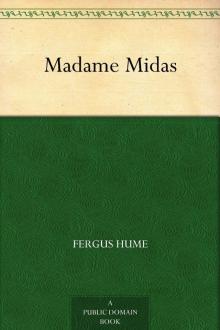 Madame Midas
Madame Midas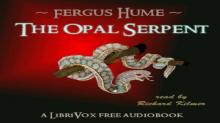 The Opal Serpent
The Opal Serpent The Solitary Farm
The Solitary Farm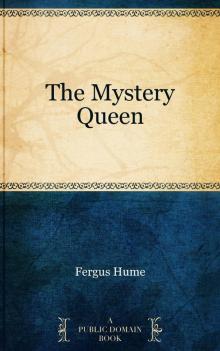 The Mystery Queen
The Mystery Queen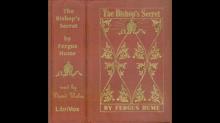 The Bishop's Secret
The Bishop's Secret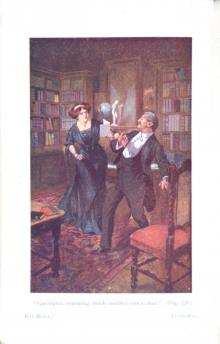 Red Money
Red Money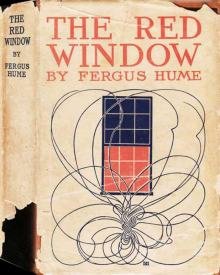 The Red Window
The Red Window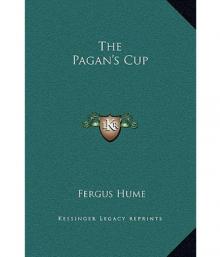 The Pagan's Cup
The Pagan's Cup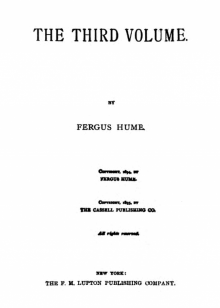 The Third Volume
The Third Volume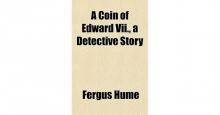 A Coin of Edward VII: A Detective Story
A Coin of Edward VII: A Detective Story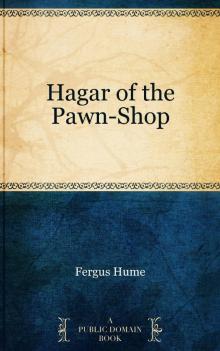 Hagar of the Pawn-Shop
Hagar of the Pawn-Shop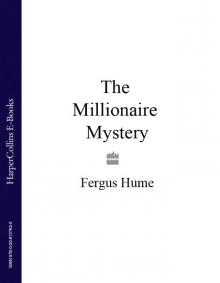 The Millionaire Mystery
The Millionaire Mystery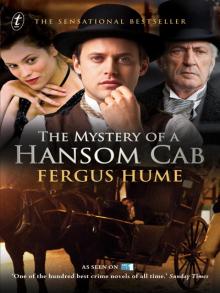 The Mystery of a Hansom Cab
The Mystery of a Hansom Cab